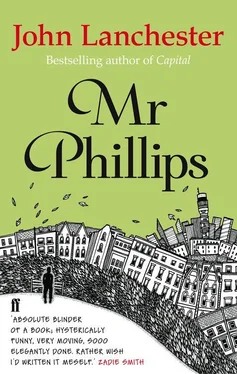A white man with dreadlocks comes out of the chemists and is greeted by his eager dog, who is wearing a collar made out of a red ribbon.
Pedestrians stream past in every direction, most of them dressed for the working day, most of them in a hurry.
Mr Phillips stops in front of the travel agent, two doors down. There are posters in the window of happy people in places with good weather. A woman of about twenty-five watches her husband batting a large beach ball into the air while two small sandy children tug at his legs. In the middle distance of another photograph, a man learns to windsurf. Child-free couples walk on beaches in front of a cinema sunset. Standing and looking at the pictures, Mr Phillips has a vision of himself beside a swimming pool somewhere hot. At his right side, a cold drink beaded with sweat and icy to the touch. At his left, Karen the secretary, face down, in a leopard print bikini, tiny volcanic irregularities of smoochable cellulite crawling under her bikini bottoms, a stray brown pubic hair visible to the truly attentive eye, her back also beaded with sweat, shiny with suntan oil, hot to the touch. On his stomach, which is flatter than in real life, Mr Phillips balances a copy of the Daily Mail , where he is reading about Europe’s triumph over America in the Ryder Cup, or England’s over Australia in the Ashes, or studying a business story about how some company in which he just happens to have bought lots of shares has surged 1000 per cent upwards in a week, or looking at the fashion pages and picking out a pink frock with a slashed shoulder whose scooped ovoid neckline would suit Karen only too well. A list of prices for flights hangs beside one for all-in holiday packages:
Malaga £179 for 2 weeks Morocco £219 return San Francisco £239 return Costa Rica £299 return Faro £85 return New York £190 return Alicante £84 return Paris city break from £109 room Atlanta £229 return £15 p.p.p.n Ask us about Vietnam!
Everything seems implausibly cheap, given the distances involved.
It wasn’t always like that. The Phillips family holidays were gruelling but are now a false happy memory, and when the Phillipses were gathered together they often spoke of them — the time Martin’s canoe sank off the beach in Majorca, the time Tom was sick over a waiter in Corfu. Mr Phillips’s favourite holiday had been on honeymoon in a cottage in Cornwall, hired via an old friend of Mr Phillips’s father who ran a rental agency. The newly married Mr and Mrs Phillips had made love twenty-seven times in the week. Even then he had liked to count.
At the moment there is, or was, a plan to save enough to spend some time in the sunshine over the winter, a vision which appears to Mr Phillips as a girl’s bottom, golden, with an almost invisible strip of cloth plunging vertiginously between her buttocks, an image all too familiar from TV but never seen in real life. It was a sight he felt he deserved to see at least once. This holiday is the first glimpse of a promised prosperity which in theory looms now that there is only one more year of payment left to go on the mortgage, thank God, and Martin has left home and Tom has only two years to go to official adulthood and the possibility of his leaving for college — though Mr Phillips somehow can’t see that, since his younger son’s pantomime defiance and self-sufficiency has within it, he feels, an unappeasable core of neediness. Tom isn’t the moving-out type. Still, the Phillipses are, or should be, coming up to that stage in life where prosperity looms in front of middle-aged, middle-class couples like a plush, well-appointed antechamber to the grave, or a luxuriously fitted waiting room outside the offices of a doctor whose prognoses are exclusively fatal.
‘What do you think you’re doing, Phillips?’
Mr Phillips experiences momentarily and unpleasantly the sensation that his thoughts are legible to any passer-by. But no, this is simply Mr Tomkins, the bumptious co-founder of the local Neighbourhood Watch scheme, whose daughter Mrs Phillips coached to scraping a pass in Grade Four piano before she fell in love with her former gym teacher and emigrated to New Zealand. Tomkins’s approach to the world had not changed. You had to give him credit for that. Or not, or something.
‘A man can dream,’ says Mr Phillips. Tomkins is wearing a suit that has at least three pieces and would perhaps turn out to have more under closer inspection. He works in a bank, turning down applicants for loans and overdrafts. Mr Phillips can imagine having a worse bank manager than Mr Tomkins, but only with difficulty.
‘Off to work?’
‘Men must work’, says Tomkins, heading down the road towards the railway station, his furled umbrella swinging in his right hand on this dry day, ‘and women must shop .’ He has spoken over his shoulder and now he’s gone.
Once Tomkins has cleared his own blast area, Mr Phillips sets off after him. Acrowd of people are getting on to a double-decker bus as he squeezes past. The street is blocked in both directions, as a fuming K-reg Mondeo has tried to squeeze past the bus, only to realize that the oncoming unloading laundry van doesn’t offer enough room, and so the road is now officially chocka, at a standstill. The quickest moving things are pedestrians and a mad cyclist, dressed like a parody of a civil servant with bowler hat and cycle clips, dodging impatiently between the growling stationary vehicles. When he drives and gets stuck like that Mr Phillips has a vision of the whole city being locked in by immobile traffic, a pattern of stalled and blocked-in vehicles ramifying and spreading like a pattern of crystals growing under a microscope, so that the jam — a totally solid gridlock, not just slow-moving but fixed — gradually spreads all over the capital, junctions clogging, back flows building up, a cancer of stasis blocking every traffic light, intersection, box junction, mini-roundabout, square and one-way system, the whole city gradually and permanently shutting down like a dying brain.
Mr Phillips, his return ticket tucked in his jacket pocket like a handkerchief, stands on the platform at Clapham Junction and waits for his train. It’s already getting warmer, and it’s possible to wish that he had worn a lighter suit. Even his briefcase looks as if it might be beginning to sweat. Along the platform a straggling line of fellow commuters is ready to rush the next train, and is filling the time by reading newspapers, though there are variant activities too — a girl in a knee-length split skirt nodding her head as she listens to a walkman, and a few oddbods reading books. Mr Phillips has not taken his book out of his case; he prefers to watch and wait. Next to him on one side a very tall man in jeans and a T-shirt is reading the Daily Sport, stopping at every other page to inspect with real care the pictures of naked women, all of whom to Mr Phillips’s eyes have breasts that are implausibly large and unerotically rigid, as if they had been inflated especially for the occasion. Not for the first time Mr Phillips wonders who these girls are.
He does a calculation: the papers publish say seventy pictures of girls with no clothes on a week — a highly conservative figure, given that there’s one every day in the Sun , one in the Mirror , seven in the Sport , one in the Star , plus say another dozen on Sundays, which comes to seventy-two. So that’s 72 times 52 naked girls a year, which is 70 times 50 is 3500 plus 70 times two is 140 is 3640 plus two times 52 is 104 is 3744 naked girls in the newspapers. Then magazines, dirty magazines per se, there are dozens: Fiesta, Men Only, Knave, Penthouse, Playboy, Mayfair, also specialist magazines, Asian Babes , big tit mags, fat girl mags, Readers’Wives , you name it; so assume, again super-conservatively, at least twenty-five magazines coming out every week, with say ten girls per issue each, which would probably be more if you allow for smaller pictures in the personals, round-ups, last year’s greatest hits etc, but say ten per issue, which is 25 x 10 = 250 naked girls per week times 52 is 50 times 250 is 12500 plus 2 times 250 is 500 = 13000. When you add the newspaper figure this gives a very very conservative estimate of 3744 plus 13000 = 16744, which is the number of British women happy to take their clothes off for money per annum. All of them, except the specialist interest ones, have bodies like the girl in the photograph that the man has now stopped looking at as he turns the page to begin reading a piece called ‘Hanky-Panky No Thanky! Neighbours’ Spanking Game Keeps Street Up All Night’.
Читать дальше




![Unknown - [Carly Phillips] The Bachelor (The Chandler Brothe(Bookos.org) (1)](/books/174132/unknown-carly-phillips-the-bachelor-the-chandle-thumb.webp)







